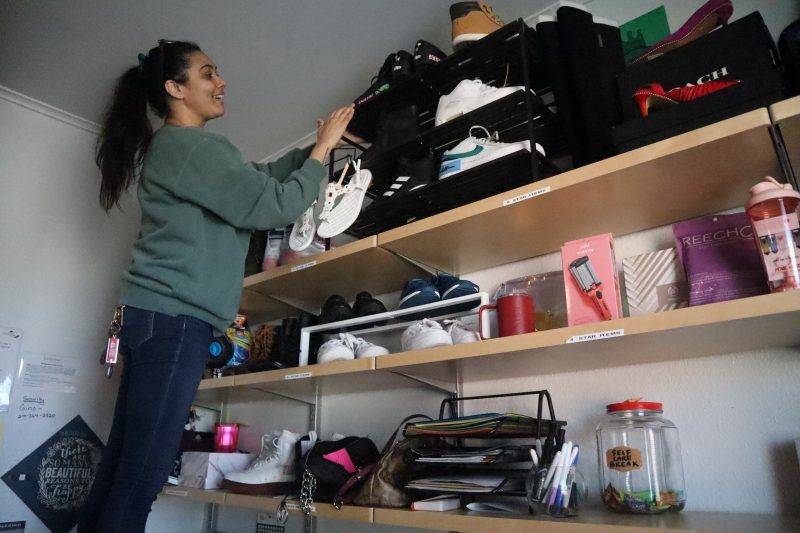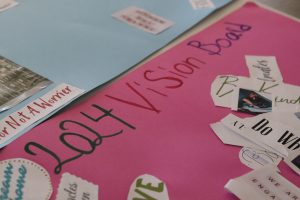Texas Is a National Leader in Human Trafficking Cases. Experts Say the Issue Is Often Misunderstood.
By Michelle Lavergne
Reporting Texas

Siobhan Cook shows an array of luxury prizes that their clients can choose from when they complete 10 stamps on attendance cards they receive from the SAFE CARES program. Michelle Lavergne/Reporting Texas
When Siobhan Cook is at work, a big part of her day is meeting the immediate needs of youth who have survived trafficking or are at risk. As drop-in manager for SAFE CARES, a program focused on supporting human trafficking survivors, Cook’s tasks can be as basic as making sure her clients have food and Uber rides to doctor’s appointments.
“Sometimes they just need emotional support,” said Cook, a 36-year-old survivor of trafficking herself.
Texas is a national leader in trafficking cases. More than 3,500 victims in Texas established contact with the National Human Trafficking Hotline in 2021, according to hotline statistics. These numbers are exceeded only by California.
Cook and other experts say the geographical and population size of the Lone Star State contribute to its high number of trafficking cases. They also say the issue is often misunderstood and disappointedly used by some politicians to make political hay.
In the popular imagination, the narrative of an evil trafficker kidnapping a victim has muddied the public’s perception of sex trafficking. In reality, those involved in helping survivors say, most trafficking cases don’t involve kidnapping or force by strangers, but rather emotional manipulation by someone the victim knows and trusts.
Conspiracy theories have been shaping narratives about human trafficking for the past few years. Pizzagate, a conspiracy theory targeting prominent Democrats, alleged a pizza parlor in Washington, D.C., was harboring a child sex trafficking ring — and paved the way for the wide-ranging QAnon conspiracy that gripped many on the far right.
When the movie “Sound of Freedom” debuted in July 2023, it quickly gained traction among politically conservative audiences. In the film, child trafficking victims are kidnapped by strangers, and a former homeland security agent turned vigilante goes on a mission to recover them.
Key right-wing figures, including former President Donald Trump and Texas GOP Sen. Ted Cruz, promoted the movie.
“Wow. Wow. Wow,” Sen. Ted Cruz tweeted, encouraging his supporters to watch the film.
Wow. Wow. Wow.
GO SEE #SoundOfFreedom
“‘Sound of Freedom’ topped the charts with $14.3 million in ticket sales at 2,634 theaters on July 4….
‘Indiana Jones’ came in second with $11.7 million at [nearly DOUBLE] 4,600 theaters.” https://t.co/XJMlzICzEC
— Ted Cruz (@tedcruz) July 6, 2023
Following the movie’s release, Red Oak Hope, an Austin-based nonprofit organization dedicated to the rehabilitation of trafficking survivors, released a newsletter cautioning people to take the film’s depiction of trafficking with a grain of salt.
“When dramatized stories become the dominant narrative of what trafficking looks like, victims are often unable to self-identify and seek help,” their newsletter read.
Rhonda Kuykendall, a trafficking survivor, speaker and legislative advocate who lives in the Houston area, said that the majority of cases in the U.S. involve “Americans exploiting Americans.”
“You have half of our population clutching their pearls and decrying migrants crossing the border, but nobody’s paying attention to the real issues,” Kuykendall said. “They are not looking into systemic issues of poverty, lack of education and the existence of marginalized communities that perpetuate human trafficking.”
Kuykendall’s own survivor story empowered her to engage in lobbying efforts that led to the 2007 abolishment of the state statute of limitations when reporting child sexual assault in 2007.

Among the activities that SAFE CARES clients create are vision boards to help motivate them to achieve their goals. Michelle Lavergne/Reporting Texas
In 2015, Gov. Greg Abbott formed the Child Sex Trafficking Team under the Public Safety Office to facilitate a holistic approach to preventing sexual exploitation of the youth.
“Under this initiative, Texas is broken out into five different regions — with each region focusing on providing direct services to child victims,” Kuykendall said.
SAFE CARES has identified “Romeo pimping” as a very common form of sex trafficking in Texas. A Romeo pimp as a trafficker who lures young people into a romantic relationship with the goal of sexually exploiting them. Some traffickers trap their victims through drug coercion.
“They will give you drugs for free in the beginning — that’s how they got me as an adult,” said Cook, who talks about her personal experience as a trafficking survivor with many of her clients. “Drug coercion starts a vicious cycle of drug addiction. Victims start to rely on the drugs to numb themselves from the abuse of the traffickers. Meanwhile traffickers rely on the drugs to dehumanize and control the victims.”
Cook says it can also be very difficult for victims to leave their traffickers because of trauma bonding.
“It takes years for this to happen,” Cook said. “There are an average of eight attempts before a victim is able to leave, if they can leave at all.”
In order to help track human trafficking trends in Texas, the Child Sex Trafficking Team In 2019 started funding Lighthouse, a software platform developed by Austin-based Allies Against Slavery. Lighthouse is used in identifying individuals vulnerable to trafficking.
Hundreds of agencies, including the juvenile justice system, the Department of Family Protective Services and various child advocacy centers, have been utilizing Lighthouse, said Quinn Pierson Kenney, marketing director for Allies Against Slavery.
“As of October last year, we had over 130,000 screenings and about 10% of those are what we call clear concern, who are at the highest risk,” Pierson Kenney said. “Some of the indicators that we see are involvement in juvenile justice, have runaway status, have experienced past sexual abuse and involvement in the welfare system.”
Familial trafficking also happens across Texas, with generational poverty perpetuating the issue, Cook said. “The parents groom these kids to exploit themselves from a very young age to help the family with money.”
However, Cook noted that trafficking also happens among affluent households that have parents who have highly demanding jobs and busy social lives.
“I know a story of a few girls whose pimp had gotten a hold of their fathers’ credit cards,” Cook said. “To get the credit cards back, the victims were forced to comply with traffickers in order to protect themselves and their families.”
“Trafficking has such a high intersectionality with many other forms of abuse,” Cook added. “The wider variety of services we can collaborate on building, the better the chances are for survivors to get their needs met when engaging with them.”

Scrawled on the mirror hanging by the kitchen is a message to help remind their clients of their worth. Michelle Lavergne/Reporting Texas